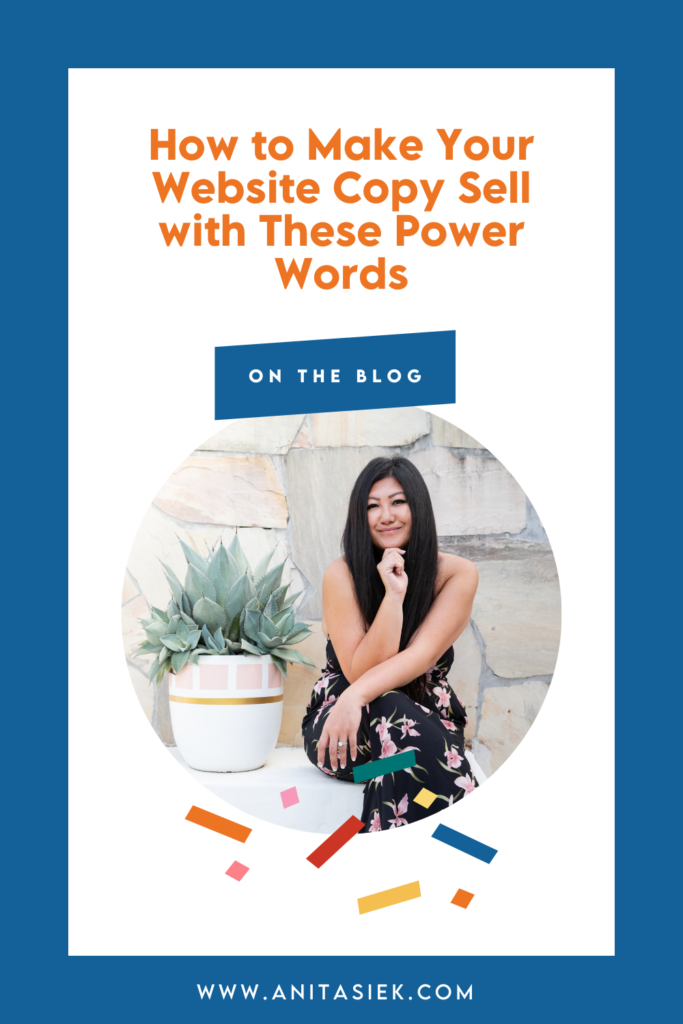The Anita Siek Blog
The Brandfetti Podcast
The Wordfetti
Shop
Podcast
Personal
Content Magic
Business
Lawyer (yep-a-dee-yep, I used to write things people never read) turned Brand and Copy Strategist, and Word-ucator for brands like you, who want to ZIG when others zag.
Hi, I'm Anita!
How to Make Your Website Copy Sell with These Power Words

Photo credit: @violettinder
Podcast Shownotes (Bullet)
- What is Power Words and why it tends to be a hidden secret amongst copywriters and marketers?
- 1st category: Greed
- 2nd category: Curiosity
- 3rd category: Fear
- 4th category: Sloth
Podcast Shownotes (Timestamps)
01:05 – 02:32: What is Power Words and why it tends to be a hidden secret amongst copywriters and marketers?
03:37 – 05:13: 1st category: Greed
05:17 – 06:40: 2nd category: Curiosity
06:43 – 08:56: 3rd category: Fear08:58 – 10:07: 4th category: Sloth

What the heck are power words I hear you say? Sounds like word wizardry.
Well kinda, yeah. Power words tend to be a hidden secret amongst us copywriters.
Long story short? There are a series of words in the English dictionary that trigger a particularly emotional or psychological response.
These babies are the (delicious) bread and butter of the word family and are usually found in 4 key areas when it comes to content: headlines, subheadings, meta descriptions, and the call to action.
They light up the right parts of our brain and grab our (hard to get) attention, making us feel something and triggering a hardwired psychological response.
They may be seen like minor changes, but the choices in a single word can have a profound impact on the reader. And it can be the difference between someone simply reading, to someone reading and taking action.
I’m going to throw down 4 of the most common power word categories.
[Note this isn’t about spraying these power words everywhere in your content. You have to use them strategically. So a tip here? Take the time to first think about the action you want your readers to take (e.g. buy? Comment? subscribe?) and what emotions and motivators will help them, take that action, then work backwards to find the best words to evoke that emotion].
Alright, let’s dive straight in.

Greed
This category plays on scarcity and loss aversion, the emotion it targets relate to situations where we are wanting to achieve MORE than we actually need. Whether that’s through the motivator of wanting to “be the first” or “get something that’s exclusive and not readily available”.
These are words like: “skyrocket”, “new”, “before”, “hurry”, “bonanza”, “don’t miss out”, “fast”, “instantly”, “running out”, and “whopping”.
Let’s say you’ve got a pop up on your website wanting someone to opt-in to your freebie.
Version 1: “Want to get our free e-book with over 52 tips e-book for XYZ?”
Version 2: “Before you go, don’t forget to get your hands on our new 52 tips e-book designed to help you skyrocket XYZ.”
The second one sounds a bit more enticing thanks to the power words, “before you go”, don’t forget” and “new” and “skyrocket” right?
Want to learn more about power words? We’ve got a freebie for that! Grab your free e-lesson for everything you need to know for a copy glow up.

Curiosity
Curiosity words centre around the concept of a need, desire or a thirst for knowledge. According to researcher Berlyn (1960), curiosity is a motivational prerequisite for exploratory behaviour. It’s about knowing, learning, and gathering information about the environment.
Curiosity power words should be used in copy to really spark and connect to a reader’s curiosity.
These are words like “Shh!”, “Sneak peak”, “Secret”, “Behind the scenes”, “untold”, “be the first”.
These are words you might want to consider for blogs, landing pages, email subject lines because they make the content absolutely irresistible.

Fear
Fearwords are perhaps the most powerful of this bunch. As humans, we have an instinct to protect ourselves and shy away from anything that may harm us. So to safeguard our asset, brand, business, ourselves, we take actions to ensure it’s always kept at arm’s bay.
In saying this, fear words should be used with caution. The goal is not to have your readers feel fearful.
Instead? It’s about letting them know you recognise their pain point, and that you have a solution.
These words are words like “Hack”, “Risky”, “Trap”, “Silly”
So instead of saying “The 5 Mistakes Made on Instagram”, tweak to “5 of the Silliest Mistakes Made on Instagram” or instead of “The 3 Things to Look Out for in Your Business” try “The 3 Things That are Putting your Business at Risk, Now”.

Sloth
Sloth words are exactly how it sounds. These words are powerful especially when targeting those who are perhaps not motivated to do more than the absolute minimum to achieve their goal.
They’re for people who are searching for a done-for-you roadmap, or a cheat sheet or a better way of working.
These words include: “freebie”, “easy”, “template”, swipe”, “roadmap”, “now”. They are words that can make your resource, or lead magnet sound more useful.
For example, instead of “7 Tips to Getting More Engagement on Instagram”, try “7 Ridiculously Simple Ways to Get More Engagement on Instagram Now”.
So viola! Hopefully, that sharp-shoot lesson gave you all a glimpse into how the smallest of changes can result in a big impact on your copy and have it stand out.
Want some more hot copy tips? You can get them delivered straight to your ears with our Brandfetti podcast.
Want to get more copy, brand and content tips? Listen in on Brandfetti and follow me here and the team here.

Check out these popular posts


